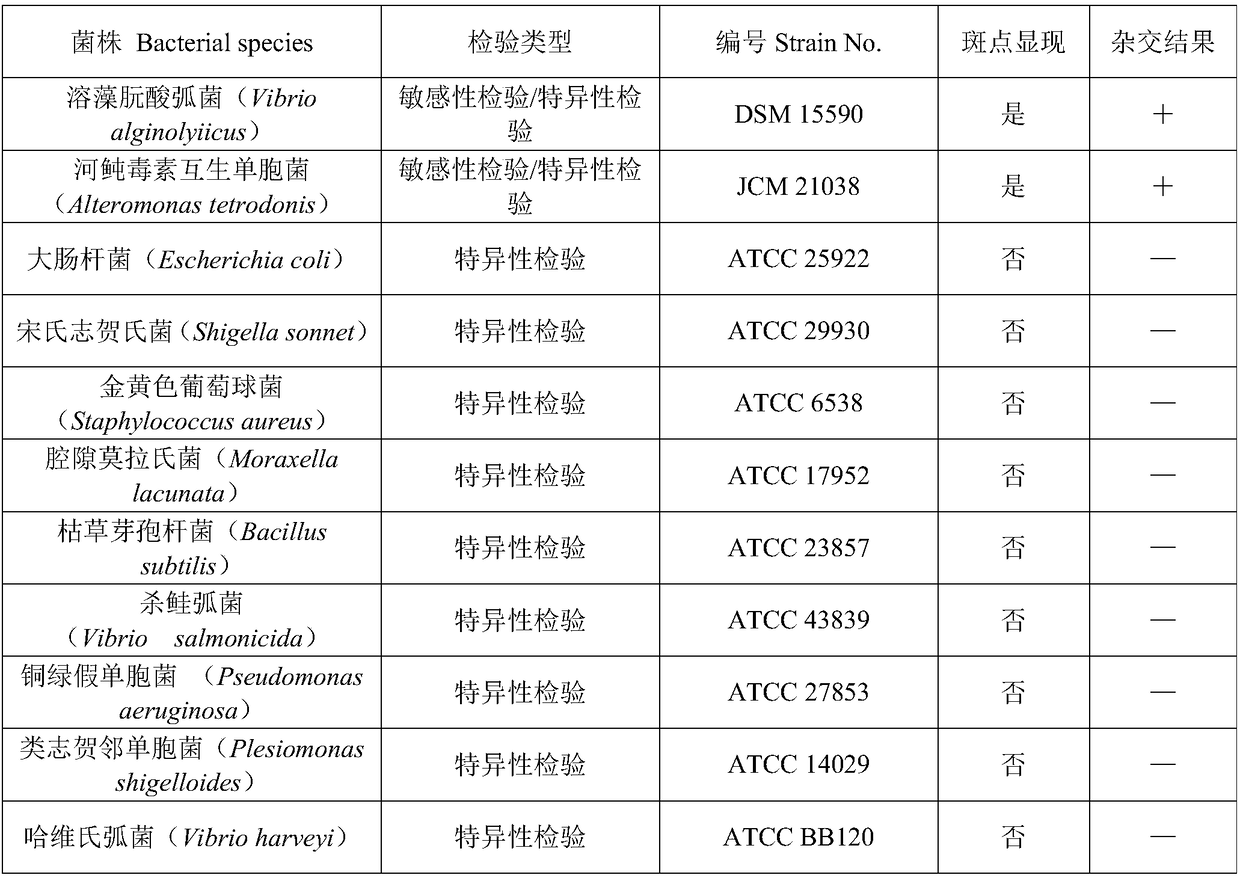Method for rapidly screening microorganism strain capable of generating tetrodotoxin and digoxin labeled DNA (Deoxyribonucleic Acid) probe used by method
A Digoxigenin labeling and DNA probe technology, applied in the field of marine biology, can solve the problems of heavy workload, high analysis cost, and long cycle, and achieve the effect of low error, high efficiency, and not easy to operate error
- Summary
- Abstract
- Description
- Claims
- Application Information
AI Technical Summary
Problems solved by technology
Method used
Image
Examples
Embodiment 1
[0029] Sensitivity testing sample strains were cultivated, and samples were taken of Vibrio alginolyiicus VA (Vibrio alginolyiicus VA, whose metabolites were confirmed to produce TTX toxin by chemical analysis), and a single colony on the plate of the VA strain was picked, and its DNA sample was extracted according to the conventional method of molecular cloning, Dilute it 5-10 times.
Embodiment 2
[0031] Specific detection sample strain cultivation, take samples of 2 strains of toxin-producing bacteria (Vibrio alginolyticus, Alteromonas tetrodotoxin), 9 strains of non-toxin-producing bacteria (including Escherichia coli, Shigella sonneri, Golden Staphylococcus aureus, Bacillus subtilis, Pseudomonas aeruginosa, Vibrio harveii, Vibrio salmonicida, Moraxella lacunae, P. The DNA samples were extracted according to the conventional methods of molecular cloning, and diluted 5-10 times.
Embodiment 3
[0033]A method for rapidly screening microbial strains producing tetrodotoxin, said method comprising the following steps:
[0034] 1) Take 2 μL of the sample prepared in Example 1 or Example 2 and put it on a nitrocellulose membrane to make the membrane to be tested, soak the membrane to be tested in 0.3mol / L NaOH solution for 5min, and place it at 60°C after immersion Dry for 1 hour to immobilize DNA, then place it in 3 mg / mL lysozyme solution with pH 7.6, warm water bath at 35°C for 15 minutes, wash off bacterial cell residues on the membrane surface with TE buffer to obtain pretreated DNA membrane , placing the obtained pre-treated DNA membrane in a hybridization solution, and incubating at 40°C for 40 minutes to obtain a pre-hybridization solution;
[0035] 2) Put the digoxin-labeled DNA in boiling water for 8 minutes and cool it in an ice bath to obtain a labeled DNA solution. Take the labeled DNA solution and add it to the pre-hybridization solution obtained in step 2) ...
PUM
 Login to View More
Login to View More Abstract
Description
Claims
Application Information
 Login to View More
Login to View More - R&D
- Intellectual Property
- Life Sciences
- Materials
- Tech Scout
- Unparalleled Data Quality
- Higher Quality Content
- 60% Fewer Hallucinations
Browse by: Latest US Patents, China's latest patents, Technical Efficacy Thesaurus, Application Domain, Technology Topic, Popular Technical Reports.
© 2025 PatSnap. All rights reserved.Legal|Privacy policy|Modern Slavery Act Transparency Statement|Sitemap|About US| Contact US: help@patsnap.com

